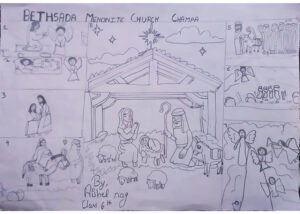I’ve become aware of various patterns and cycles in my life. One of them is a regular oscillation between two different “kinds” or phases of faith. Sometimes I remain in one phase for years and sometimes I alternate between the two phases multiple times a day.
The first phase is what I call pragmatic faith.
Pragmatic faith accepts reality as it is. It accepts suffering, injustice, difficulty and impermanence as part of life. It accepts that everyone and everything changes and dies. It accepts that many of our struggles will be things we struggle with for the rest of our lives. It accepts the imperfection and incompleteness of everything, including ourselves. It accepts that most of us will never have the life we dream of and will have to settle for second, third or seven-hundredth best. Because this is the world God created and we trust God.
Pragmatic faith often places ultimate hope in the next life where everything will be better, where we won’t have to worry about health issues, money problems or loneliness. But for now, pragmatic faith is what helps us accept all the hard-to-accept realities in this life. It isn’t fatalism though. Pragmatic faith accepts our duty to right what is wrong in the world. It obeys God’s command to love, forgive and serve others, especially the less fortunate. Yet it’s also how we cope when there’s nothing we can do to help others or fix what’s wrong with the world.
Pragmatic faith trusts God but doesn’t really expect God to intervene in earthly affairs. God gives us strength, wisdom, family and community to get through the trials and tribulations of life and grants us gifts, abilities and resources to live right and serve the greater good of all.
The second phase I call transcendental faith.
In this phase of faith I’m overwhelmed with wonder, beauty and possibility. I see the “magic” of life everywhere I look. It’s like I’ve been transported to another world where everything is new, exciting and full of promise. Here, nothing is impossible. I sense a mysterious divine plot unfolding in every aspect of life, bringing resolution, reconciliation and renewal to all things, and I’m invited to participate in this timeless story of redemption. I sense Divine Spirit active in the world, transforming things, situations and people. The whole world has become a “thin place,” where God manifests in thousands of different ways. The next manifestation could be right around the corner, if I have eyes to see and ears to hear.
I wake up each morning with excitement and expectation. Where will I encounter Divine Spirit today? Ordinary encounters with trees, snowflakes and strangers become extraordinary. Everyone and everything is a beautiful sacred mystery. Every minute of the day has potential to be a life-changing encounter with the Most High. In this phase I know God is present, transforming the world in mysterious and miraculous ways.
The past few weeks I’ve been reflecting on why I cycle between these two kinds of faith that are so different and seem to contradict one another. Is one right and the other wrong? Are they both partially right? Does it depend on my circumstances or mood?
Then another thought occurred. What if both are right? In every moment. It’s just my dualistic mind can only grasp the truth of one at a time, because to hold both equally true in the same moment would be to enter paradox. Hmmmm. What if that’s the point?
A paradox is essentially two or more truths that are incompatible and contradictory but, when held together, reveal a deeper hidden truth. The heart of the gospel message is paradox. (The claim that Jesus is 100 percent God and 100 percent human is a paradox for example.)
Christ is paradox, so to enter life “in Christ” requires paradoxical faith—a faith that is able to hold contradictory truths together in the same moment, such as the pragmatic and transcendental dynamics of faith. When we live in this paradoxical tension, it opens us up to deeper truth—what Paul calls the mystery of the gospel.
Paradoxical faith creates space in us for paradoxical experiences. To experience total fulfillment and a holy desire for more at the same time. To be completely at peace with everything while driven to move mountains and change the world. To hold joy and sorrow, mercy and justice, belief and doubt, hope and skepticism in the same breath.
This is life “in Christ.” This is a whole new level of freedom and wholeness.
Troy Watson will be practicing paradoxical faith throughout 2020 and will keep you posted.
Read more Life in the Postmodern Shift columns:
Ten New Year’s resolutions for an unexamined life
Unlearning ‘Christianese’
Credible Christians
Revolutionary hospitality
The divine flame









Leave a Reply
You must be logged in to post a comment.